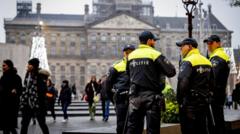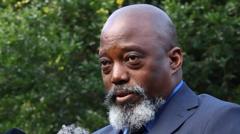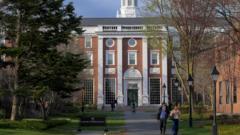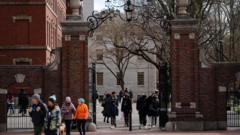The recent violence in Amsterdam has not only revealed underlying community tensions but also sparked a broader discussion about integration, safety, and the importance of mutual understanding among diverse populations.
Tensions Rise in Amsterdam Amidst Violence and Community Strife

Tensions Rise in Amsterdam Amidst Violence and Community Strife
Amsterdam grapples with aftermath of violent unrest as societal tensions escalate
Tensions continue to simmer in Amsterdam following the violent clashes that erupted last week, triggering discussions over societal rifts in the city. The unrest began when Israeli football fans were attacked during their visit for a Europa League match against Ajax, leading city officials to label the situation a “volatile mix of antisemitism, hooliganism, and anger” stemming from ongoing conflicts in the Middle East.
The aftermath of the violence is concerning, particularly for inter-community relations between Jewish and Muslim residents. Rabbi Lody van de Kamp likened the city's state to a "tinderbox," illustrating the precariousness of existing tensions, especially after a series of provocations including flag burnings and inflammatory social media posts. Emine Uğur, a prominent columnist, argues that the frustrations borne from the war in Gaza had long been building.
In response to the violence, Amsterdam's authorities reported numerous incidents of vandalism and violent encounters, prompting Justice Minister David van Weel to reaffirm the necessity for Jewish residents to feel secure in their homeland. Nonetheless, some community leaders, like Chanan Hertzberger, have warned that historical lessons remind us that unchecked rhetoric poses grave dangers.
As political tensions within the Netherlands rise, particularly towards the Moroccan community, junior minister Nora Achahbar’s resignation after hearing derogatory remarks at a cabinet meeting demonstrates the fractious atmosphere. Local advocates have voiced concerns that the rhetoric linking antisemitism to broader ethnic discontent may deepen societal divides rather than bridge them.
In the wake of these events, some Jews have taken to concealing symbols of their faith, fearing repercussions, while Muslim community members lament their treatment as scapegoats for a larger issue. As pro-Palestinian protests persisted in the days following the unrest, academics and leaders have called for dialogue and understanding to prevent further escalation.
Ultimately, Amsterdam's community faces the delicate task of redefining its identity amid compounding challenges. Mayor Femke Halsema stresses that protecting one group should not come at the expense of another and that restoring trust, unity, and mutual respect must take precedence. Rabbi van de Kamp reminds the public that anger can exist without devolving into hatred, underscoring the need for collective healing.




















